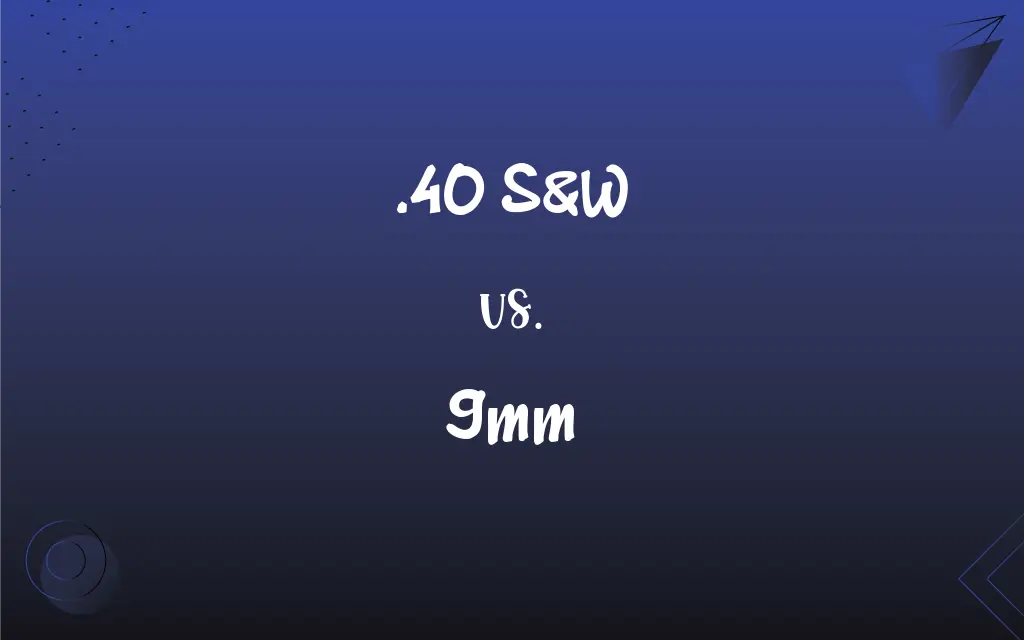.40 S&W vs. 9mm: What's the Difference?
Edited by Aimie Carlson || By Janet White || Published on March 26, 2024
The .40 S&W is a higher caliber round offering more stopping power and recoil than the 9mm, which is smaller, has less recoil, and allows for higher magazine capacity.

Key Differences
The .40 S&W and 9mm are both popular choices among law enforcement and civilians for self-defense and shooting sports. The .40 S&W, developed as a law enforcement cartridge to offer more stopping power and a better ballistic profile than the 9mm, tends to have a higher recoil and slightly lower magazine capacity due to its larger size. Conversely, the 9mm, with its smaller diameter, allows for higher magazine capacity and less recoil, making it easier to handle for shooters of all skill levels.
Regarding ballistics, the .40 S&W generally delivers more energy upon impact than the 9mm, making it a preferred choice for stopping threats more effectively. However, this increased power comes at the cost of greater recoil, which can affect rapid fire accuracy and shooter comfort. The 9mm, meanwhile, benefits from advancements in bullet technology, narrowing the performance gap in terms of stopping power while maintaining its advantages in recoil management and ammunition capacity.
In terms of ammunition cost and availability, 9mm rounds are typically more affordable and widely available than .40 S&W rounds. This makes the 9mm a more economical choice for regular shooting practice and stockpiling. The .40 S&W, being slightly more specialized, can cost more per round, potentially limiting its appeal to those on a tight budget or who shoot frequently.
The choice between .40 S&W and 9mm often comes down to personal preference and intended use. Shooters looking for more stopping power may gravitate towards the .40 S&W, while those valuing capacity and manageability might prefer the 9mm. Both calibers have proven effective in self-defense and law enforcement scenarios, with the decision often influenced by the shooter's comfort with recoil and the specific performance characteristics of each round.
The debate between .40 S&W and 9mm extends beyond mere technical specifications to include considerations of carry comfort, weapon selection, and individual shooting style. While some prefer the heavier hitting .40 S&W in larger handguns for its perceived defensive edge, others opt for the 9mm in compact models for concealed carry, valuing its lighter recoil and higher round count. Each caliber has its staunch advocates, with the choice reflecting a compromise between power, capacity, and shooter proficiency.
ADVERTISEMENT
Comparison Chart
Bullet Diameter
Larger, approximately 10.2 mm
Smaller, approximately 9 mm
Recoil
Higher, due to more powerful load
Lower, easier for rapid follow-up shots
Magazine Capacity
Generally lower
Higher, due to smaller cartridge size
Stopping Power
Higher, with more energy transfer
Lower, but improved with modern ammunition
Ammunition Cost
Generally higher
Lower, more widely available
ADVERTISEMENT
.40 S&W and 9mm Definitions
.40 S&W
Known for its balance between power and capacity.
The .40 S&W strikes a perfect balance for my personal defense needs.
9mm
Offers higher magazine capacity compared to larger calibers.
I prefer the 9mm for its higher capacity in a compact handgun.
.40 S&W
The .40 S&W is a high-powered handgun cartridge designed for optimal stopping power.
Law enforcement often relies on the .40 S&W for its stopping power.
9mm
The caliber of choice for NATO and various law enforcement agencies.
The 9mm's adoption by NATO speaks to its reliability and effectiveness.
.40 S&W
Utilizes a wider diameter bullet than the 9mm.
The .40 S&W's larger bullet provides more impact per shot.
9mm
Favored for its balance of performance and manageability.
The 9mm offers a good balance between stopping power and ease of use.
.40 S&W
More recoil than 9mm, affecting rapid fire accuracy.
Shooting the .40 S&W requires getting used to its stout recoil.
9mm
Widely available and economical for regular shooters.
Ammunition for the 9mm is affordable and easy to find.
.40 S&W
Preferred by some for its effectiveness in self-defense situations.
I chose the .40 S&W for its proven track record in self-defense.
9mm
The 9mm is a versatile and widely used pistol cartridge known for its low recoil.
The 9mm is my go-to for target practice due to its low recoil.
FAQs
What is .40 S&W?
A powerful handgun caliber developed for law enforcement, offering more stopping power than 9mm.
Is recoil more manageable in 9mm or .40 S&W?
Recoil is generally more manageable in 9mm due to the smaller cartridge and less powder.
What is the standard magazine capacity difference between .40 S&W and 9mm handguns?
9mm handguns typically hold more rounds than their .40 S&W counterparts due to the smaller size of the 9mm cartridge.
What distinguishes 9mm from .40 S&W?
The 9mm is a smaller caliber with less recoil and higher magazine capacity than the .40 S&W.
Is .40 S&W better for self-defense than 9mm?
Preference varies; .40 S&W offers more stopping power, while 9mm allows for more rounds and easier handling.
Can 9mm ammunition be used in a .40 S&W firearm?
No, due to different sizes and chamber pressures.
Which caliber is more widely used by law enforcement, .40 S&W or 9mm?
Both are used, but 9mm has seen a resurgence in law enforcement due to its capacity and manageability.
Does .40 S&W offer a significant advantage over 9mm in stopping power?
Yes, the .40 S&W is designed to offer more stopping power, though modern 9mm ammunition advancements have narrowed the gap.
How do bullet velocities compare between .40 S&W and 9mm?
The .40 S&W generally has a lower velocity than 9mm, due to its heavier bullet.
Which is more expensive to shoot, .40 S&W or 9mm?
The .40 S&W typically has higher ammunition costs than 9mm.
Which caliber is more popular among civilian shooters, .40 S&W or 9mm?
The 9mm is more popular due to its lower recoil, higher capacity, and affordability.
How do the physical dimensions of .40 S&W and 9mm cartridges compare?
The .40 S&W has a wider diameter and usually a slightly longer case than the 9mm.
What are the maintenance considerations for .40 S&W versus 9mm handguns?
Both require regular maintenance, but .40 S&W firearms may experience more wear due to higher pressures and recoil.
How does the choice between .40 S&W and 9mm affect concealed carry options?
9mm firearms tend to be more compact and easier to conceal due to the smaller size of the cartridge.
Are there specific situations where .40 S&W is preferred over 9mm?
Some prefer .40 S&W for its stopping power in self-defense situations, though choice can depend on individual preference and situation.
Is there a significant difference in the range of bullet weights between .40 S&W and 9mm?
Yes, .40 S&W bullets typically range from 135 to 180 grains, while 9mm bullets range from 115 to 147 grains.
How do training costs compare between .40 S&W and 9mm?
Training with 9mm is often less expensive due to lower ammunition costs.
What has been the trend in caliber preference among shooters in recent years?
There has been a trend towards 9mm due to its balance of capacity, recoil, and effectiveness, along with advancements in ammunition technology.
Can .40 S&W and 9mm be used interchangeably in multi-caliber firearms?
Some firearms are designed to use both calibers with different barrels or conversion kits, but they are not interchangeable without modification.
Are there differences in the availability of defensive ammunition for .40 S&W versus 9mm?
Both calibers have a wide range of defensive ammunition, though 9mm may offer more variety due to its popularity.
About Author
Written by
Janet WhiteJanet White has been an esteemed writer and blogger for Difference Wiki. Holding a Master's degree in Science and Medical Journalism from the prestigious Boston University, she has consistently demonstrated her expertise and passion for her field. When she's not immersed in her work, Janet relishes her time exercising, delving into a good book, and cherishing moments with friends and family.
Edited by
Aimie CarlsonAimie Carlson, holding a master's degree in English literature, is a fervent English language enthusiast. She lends her writing talents to Difference Wiki, a prominent website that specializes in comparisons, offering readers insightful analyses that both captivate and inform.







































































